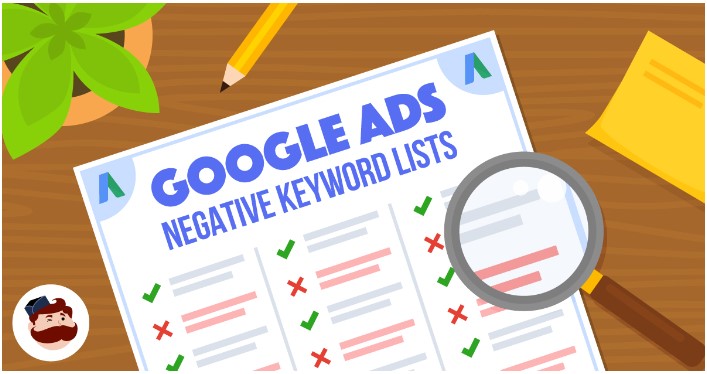Realizing that not everyone can use the thing you put your heart and soul into is a sobering realization.
That’s correct: Not everyone desires a food delivery service that offers hot meals at any time or an app that serves as a daily task reminder. It’s not feasible to always make everyone happy, and that’s okay!
Spending money on advertising to an audience that isn’t interested in your goods is not acceptable. What if you could target only those who are interested in your ads?
Negative keywords come into play here. They aid in preventing irrelevant traffic from viewing your adverts.
Negative Keywords: What Are They?

You can omit a word or phrase from your campaign by using a negative keyword. Negative keywords enable you to effectively sift out potential customers who are not interested in your offerings so that you can concentrate on reaching the proper leads. They can increase the effectiveness and profitability of online advertising when applied properly.
A negative keyword would make sure your advertising doesn’t display when someone is searching for “cheap car insurance” but you want your “car insurance” advertisements to show up when that phrase is referenced in a Google search.
With your negative keywords, the more detailed you can be, the better. Being particular helps you avoid wasting money on clients who, despite seeing your ads repeatedly, will never purchase your good or service.
Negative Keywords Come In A Variety Of Forms: Broad, Phrase, And Exact
You can utilize the wide, phrase, and precise matches as negative keywords in your Google Ads campaigns. Let’s use the unfavorable term “board games” as an illustration.
Negative broad match
Even if the terms are in a different sequence, your advertisement will not appear if the search contains all the negative keywords. Even if only a portion of the search phrases is used, your advertisement can still appear. The default setting for all Google Ads accounts is a broad match.
Negative keyword match
If all the negative keywords are present in the search, and they are present in the same sequence, your ad will not appear. Additional phrases may be used in the search, but the negative keyword must occur in the exact same order for it to be ignored.
Negative exact match
Only if the search has the precise negative keyword will your advertisement appear. The search cannot include any extra words.
Although it may seem counterintuitive to want to exclude huge segments of the population from your campaign, including negative keywords can greatly increase your return on investment (ROI). To fine-tune your keyword list, you’ll discover that there is a tonne of client behaviors and habits available online. Following are a few instances of how including negative keywords will benefit your campaigns:
Enhance Prospects’ Quality: Negative keywords will not only help you cut down on the number of unqualified leads in your campaigns, but they will also help you raise the caliber of the leads that do appear.
Increase CTR: You have a far better chance of receiving more impressions and raising your CTR when the audience is more likely to be interested in your goods.
Spend Less Money: Including unfavorable keywords in your campaign will increase your advertising costs. Negative keywords increase your ROI while lowering this expense.
How to Locate Adverse Keywords
By examining some of the data that may be mined from your accounts, Google’s numerous tools assist you in discovering potential negative keywords.
Google Keyword Tool
The keyword planner’s primary use is to find keywords to bid on, but it can also be quite useful for finding negative keywords. For instance, if you enter “boots,” it will provide the total monthly searches for that term as well as synonyms like “cowboy boots.” You probably don’t want to target a market looking for “cowboy boots” if all of your business is selling rain boots.
Report on Google Search Terms
You may see the average cost-per-click (CPC) and the number of impressions, clicks, and click-through rates (CTR) for particular search terms in the Google Search Terms Report. We are able to identify the precise search terms that are bringing up your adverts. The report provides you with information on the state of mind that motivated people to click on your adverts. You may fine-tune which keywords you want to stress and which terms you need to avoid by looking at the search queries individuals used.
Search on Google
You may only do a quick Google search to find some potential negative keyword chances. Keep an eye out for any additional results that appear when you search for the terms you want to target because you’ll want to exclude those later. For instance, if you own a record shop, you might include any unrelated search terms that are suggested.
Weed Out The Negative And Concentrate On The Positive
Negative keywords are a crucial component of any PPC campaign because they optimize your outcomes, help you save money, and cut down on the number of leads that aren’t qualified, which will ultimately increase your ROI.
You can reduce the number of searches that are possible and raise the caliber of your prospects and leads by using negative keywords in your campaign. You’ll spend less on customers who won’t buy from you if your negative keywords are more targeted.
Only a minor portion of the battle entails finding your negative keyword phrases. You must also create the ideal advertisement and optimize your landing page for PPC if you want to reach the correct audience with the right message. If you incorporate these strategies into your online advertising campaign, your results will significantly improve.





